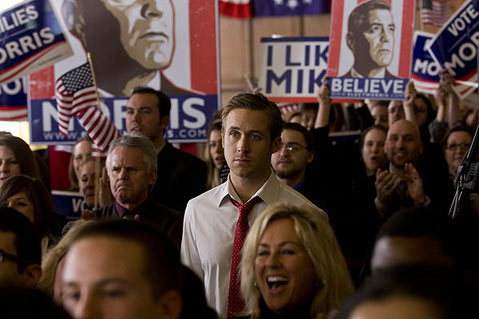The Ides of March
Ryan Gosling, George Clooney, and Philip Seymour Hoffman star in a film written by George Clooney, Grant Heslov, and Beau Willimon, based on the stage play by Willimon, and directed by Clooney.

Just in time for the early rumblings of the political circus, George Clooney’s The Ides of March arrives in theaters, reminding us yet again that what passes for truth in politics is often underscored by a world of spin and hurt. A lot of suspicions about political process and underhanded dealings are gleefully confirmed in this film, though it wisely keeps its focus on the manageable storyline focus of “what happens in Ohio” during the primaries. Plenty does, of course, including dirty deeds and dealings within the ranks of warring campaigns.
Ryan Gosling, who speaks more in single scenes here than he did in the entirety of his cool-hand film-noir role in Drive, once again impresses with his central role as a driven and charismatic campaign manager for a presidential candidate (Clooney, who seems strangely off his mark here, perhaps distracted by playing director double-duty). That wannabe commander in chief — surprise, surprise — turns out to be less ideal and idealistic than his polished image promises.
Originally a stage play, The Ides of March may gain distinction as a Hollywood movie in the fact that its characters are more inflected with shades of gray than is par for the cardboard characterization course in major motion pictures. Gosling’s character seems rooted in doing the right things within reason in this unreasonable game, but he, too, bumps up against the demons of moral undoing, having been worked from both sides by grizzled campaign connivers (played to slimy tee by Philip Seymour Hoffman and Paul Giamatti), not to mention the lure of a young woman in the picture, an intern (Evan Rachel Wood) with great campaign-unraveling potential.
For all the high points and good intentions of Clooney’s film, something doesn’t quite work as strongly or coherently as we’d hope. Melodramatic machinations grind their way into the suspense and political intrigue elements of the tale, drawing energy away from its greater promise as a film with a trenchant social comment to impart. What we do get is a strong cast and a provocative premise, working some dark yet relevant angles. It’s an edgy but polished politics-as-unusual story, a preview of real-life news cycles to come.



